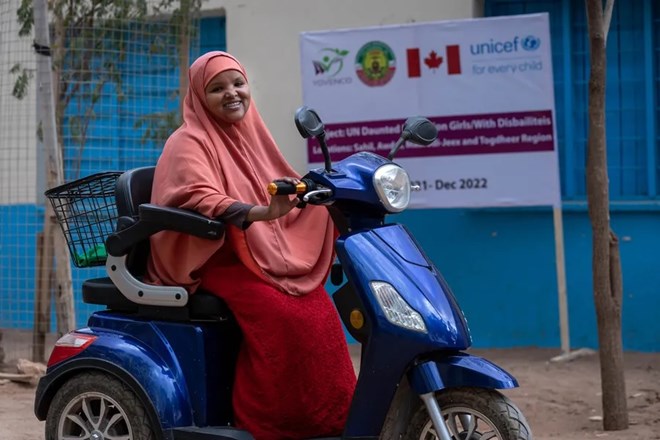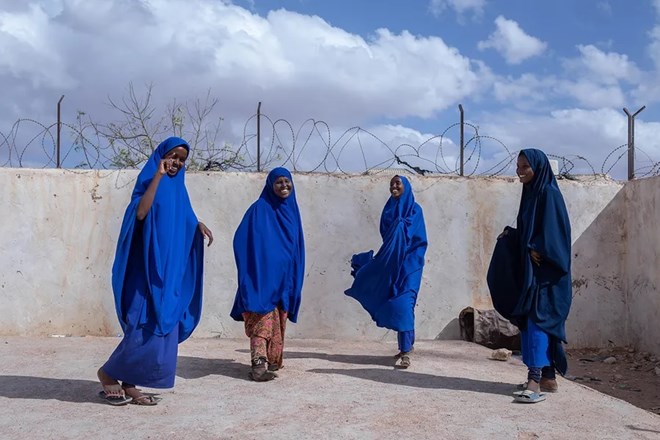
Sunday December 4, 2022

Katra is a student at a school in Somalia supported by UNICEF Canada's UNdaunted program, which provides access to education for girls with disabilities. © UNICEF/MULUGETA AYENE
For most of 17-year-old Katra’s* life, school has been a distant dream.
Born with a physical disability that impacted her legs, Katra wasn’t allowed to leave her family home in Burao, Somaliland because of the stigma around disability in her community. That meant no trips to the market, no visits with friends – and certainly no chance of attending school.
In fact, some people in Katra’s community thought there wasn’t a point in her even seeking out opportunities for education.
advertisements
“I was told many times that I was useless, good for nothing,” she says.Then, in December 2021, Katra heard about a UNICEF program that changed everything. A local non-governmental organization called Youth Volunteers and Environment Conservation (YOVENCO) visited her family to tell them about UNICEF Canada’s UNdaunted initiative.
UNdaunted focuses on the biggest barriers to education for children with physical and intellectual disabilities, especially working with parents and communities to explain why all children can benefit from access to schooling.
“Education helps break the cycle of poverty,” says UNICEF Canada president and CEO David Morley.
“The chances of child marriage decrease for girls who receive more education. They then go on to have healthier children, participate more in the formal labour market, make more money and provide better health care and education to their children in turn. So, educated girls lead to empowered women who are then able to have their voices heard on decisions for their families and society as a whole.”
And even though a lot of progress has been made in recent years, “there are significant challenges for girls and their families to enroll in and attend school,” says Emmanuelle Abrioux, chief of education for UNICEF Somalia’s Education Program.
In fact, while Somali children expect to receive an average of just 1.72 years of schooling in their lifetimes, boys tend to receive much more schooling (1.95 years) than girls do (1.48 years).
The reasons for this are complex. Girls may face challenges like child marriage and adolescent pregnancies. Abrioux also cites the direct and indirect costs of schooling – school fees, uniforms and textbooks can be costly, and families may not be able to afford losing a girl’s contributions to the household – a challenge that has been exacerbated by the country’s current drought emergency which is also impacted by food shortages and rising global prices.

Girls at recess in the courtyard of a primary school supported by UNdaunted in Somalia. ©UNICEF/UN0635171/AYENE
“Conflict and instability also impact both access and continuity of education,” she says, referring to the ongoing armed conflict between the government, allied clan militias, and Al-Shabaab in parts of the country.
“Conflict poses a direct threat to education, through attacks on schools and teachers, as well as destruction and looting of school property. This contributes to a situation where children are not safe.”
Even the gender breakdown of teachers has an impact on whether girls go to school or not. At the primary level, only 12 to 18 per cent of teachers in the country are women, and at the secondary level, this number becomes even smaller – just 5 per cent. Abrioux says the limited number of female teachers “is felt to have an impact on the ability of schools to understand and respond to girls’ particular needs.”
And for girls with disabilities, there are even more barriers. That was certainly the case for Katra.
“In the last two years, I tried to go to school but I did not have a way to get there. And, every place I went to study, there was a staircase, so it was a challenge for me. I lost hope and forgot about education,” she says.
Students who take part in UNdaunted learn under an Accelerated Basic Education model, which was designed to offer eight years of primary-level schooling in just four years. It’s not just basic schooling.
The program also outfits schools with ramps and accessible toilets, trains teachers so they understand the specific needs of students with disabilities, and provides financial support to students in the form of scholarships and a food ration program.
It has also distributed 12,000 learning kits, 34 wheelchairs, sports kits, and personal hygiene products to students in Burao.
UNdaunted receives funding from the Government of Canada, part of their advocacy and support for girls’ education and their Feminist International Assistance policy, designed to put gender equality at the centre of Canada’s international aid.
After the YOVENCO visit, Katra knew right away that she wanted to participate. In fact, she was one of the first three girls to register – and she was instrumental in encouraging other girls to take part.
“Education is the best way a person with disabilities can develop themselves,” she says. “I try as much as possible to bring people with disabilities to the school; I advise them not to give up and study. I tell every girl, the fact that you have disabilities does not mean you don’t have a life. You can achieve a lot. You and the person without a disability are the same. I always say, ‘Lift yourselves up.’”
That’s exactly what Katra is doing. Thanks to how hard she has worked, school officials will be assessing her progress to see if she’s ready to be transitioned to a formal middle and upper primary school. According to one of her teachers, it looks like she will be.
“I knew all along that one day, I would prove them wrong,” says Katra.
*Last name omitted to preserve privacy.